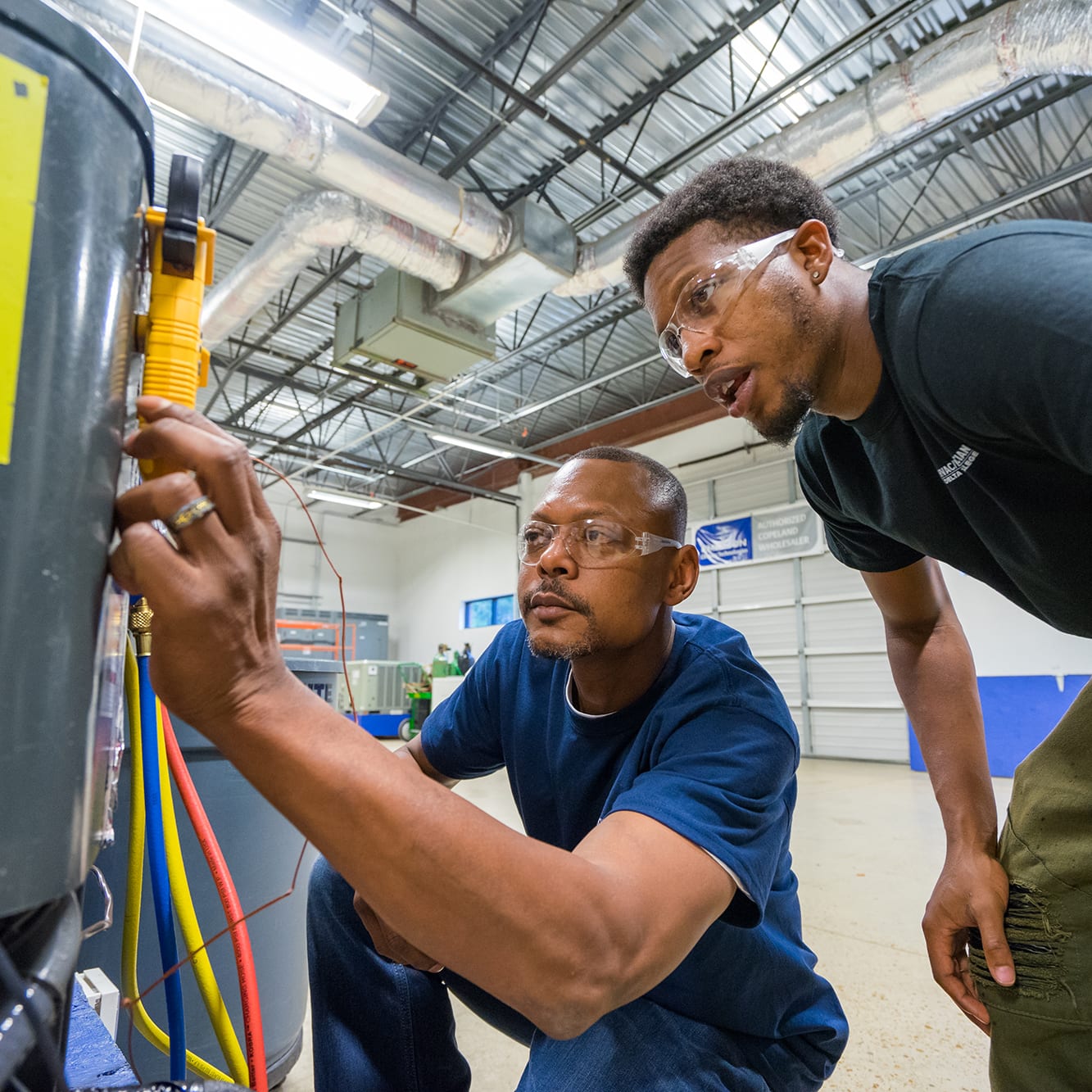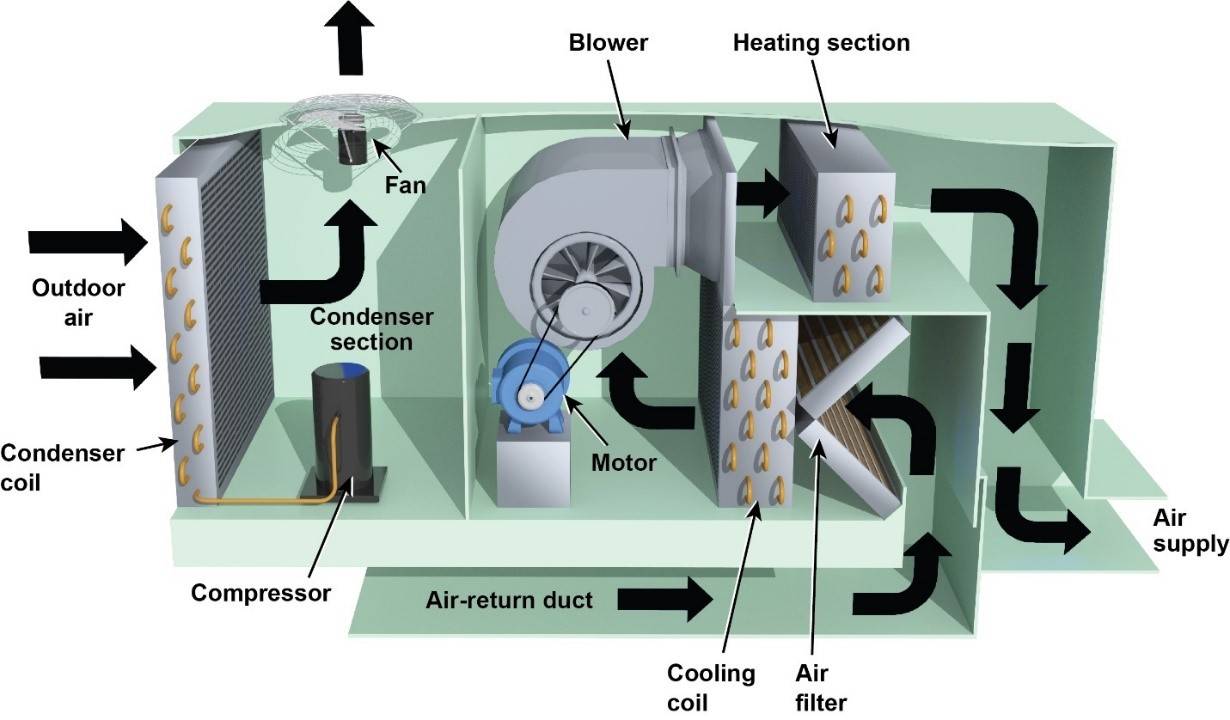An Extensive Look at Heating And Cooling Services and Their Influence On Energy Performance and Cost Savings
The function of cooling and heating services in improving energy effectiveness and attaining cost financial savings is extra critical than ever, as services and home owners look for sustainable options in a progressively eco-conscious globe. With technical improvements like clever thermostats and high-efficiency components, the capacity for enhancing system performance is large. Yet, truth effect of these advancements depends greatly on normal upkeep and aggressive concern management. As we check out the complex partnership in between heating and cooling systems and operational expenses, consisting of the change towards eco pleasant alternatives, the concern emerges: exactly how can these strategies be successfully implemented to take full advantage of both financial and eco-friendly benefits?

Relevance of Heating And Cooling Solutions
HVAC systems are an important component of contemporary structures, playing an essential duty in keeping comfy and healthy indoor settings. These systems, including ventilation, heating, and air conditioning, are important for regulating temperature level, moisture, and air high quality, consequently making certain the health of occupants. Efficient cooling and heating systems contribute substantially to creating an optimum indoor climate, which is critical for both commercial and property rooms.
In industrial structures, heating and cooling systems are integral to supplying a productive and safe environment. By managing interior environment conditions, these systems assist prevent the development of mold and mildew and the spread of airborne impurities, thus safeguarding the wellness of workers and customers. Additionally, in property setups, HVAC systems boost living conditions by offering regular thermal comfort and enhancing indoor air quality, which is essential for total health and wellness.
Furthermore, the layout and upkeep of heating and cooling systems have a direct effect on energy usage and functional prices. Correctly developed and kept systems can substantially reduce energy use, causing minimized utility expenses and a smaller carbon impact. The performance of these systems hence plays an important duty in advertising sustainability and energy conservation within buildings, highlighting their significance in the contemporary architectural landscape.
Advancements in A/c Modern Technology
Innovation in heating and cooling innovation is reinventing the method structures handle interior environments, introducing a brand-new age of efficiency and control. Current innovations have concentrated on optimizing power usage while enhancing user convenience. One significant advancement is the integration of clever thermostats, which make use of expert system to learn occupancy patterns and adjust temperatures accordingly, reducing unnecessary power usage.
Variable Refrigerant Flow (VRF) systems represent an additional significant leap forward. These systems permit for accurate temperature level control in various zones of a structure, improving convenience and lowering energy waste. VRF modern technology is especially helpful for large business spaces, supplying versatility and scalability.
Additionally, the arrival of Net of Things (IoT) devices has actually changed cooling and heating systems right into interconnected networks qualified of real-time data collection and analysis. This connection allows anticipating upkeep, making certain systems operate at peak performance and reducing unforeseen downtime.
Furthermore, improvements in products and style, such as the usage of high-efficiency coils and compressors, have boosted general system performance - Heating Contractor. The fostering of ecologically friendly refrigerants also highlights the industry's commitment to sustainability
These technical developments are crucial in lowering operational costs and ecological effect, setting new criteria for constructing climate management.
A/c Upkeep and Performance
Making certain ideal efficiency of HVAC systems extends beyond technological improvements; it additionally hinges on effective maintenance methods. Routine upkeep is essential for maintaining performance, decreasing energy usage, and expanding the life period of HVAC systems. The main goal is to ensure that all elements function at their peak capacity, thus reducing energy wastage and maintaining regular interior convenience degrees.
Routine maintenance tasks, such as cleansing or changing air filters, inspecting cooling agent degrees, and checking ductwork for leakages, are crucial for preventing unnecessary strain on the system. Filthy or blocked filters can obstruct airflow, creating the system to work more challenging and take in even more energy. Furthermore, insufficient cooling agent levels can decrease cooling down efficiency, leading to higher operational costs.
In addition, regular inspections by certified experts can identify possible issues prior to they escalate right into expensive repair work or system failings. These assessments commonly include examining electric connections, adjusting thermostats, and making certain the total honesty of the cooling and heating system. By resolving small problems early, homeowners and businesses can avoid unanticipated breakdowns and enhance power effectiveness.
Economical Heating And Cooling Solutions
For those looking to get one of the most out of their heating, air flow, and air conditioning systems without damaging the bank, exploring cost-efficient a/c remedies can make a considerable difference. One prompt procedure is to spend in programmable thermostats, which enable users to establish specific temperature levels for various times of the day, optimizing energy use and decreasing unneeded usage. By automating temperature level adjustments, home owners can accomplish substantial financial savings on power bills.
Routine maintenance is one more important element of economical a/c monitoring. Making sure that filters are cleaned up or replaced consistently, ductwork is secured, and devices are serviced by professionals can stop expensive repairs and improve system durability. Preventative maintenance not only preserves system efficiency but likewise assists in avoiding unforeseen failures that can cause pricey emergency situation fixings.
Additionally, retrofitting existing systems with energy-efficient components, such as variable rate electric motors or high-efficiency compressors, can be a sensible investment. These upgrades improve operational click here now performance, lower power usage, and can read more frequently be implemented at a portion of the expense of a full system substitute.
Ecological Influence Reduction
Reducing the environmental influence of a/c systems is vital in today's pursuit of lasting living. HVAC systems are substantial contributors to energy intake, accounting for almost 40% of power usage in business buildings. This power need frequently depends on fossil gas, leading to greenhouse gas exhausts and environmental deterioration. Transitioning to a lot more efficient systems, such as those utilizing renewable resource resources, can significantly mitigate these influences.
Technical innovations in a/c design and operation, consisting of the assimilation of smart thermostats and energy-efficient heatpump, are crucial in minimizing carbon impacts. These technologies enable maximized energy use, minimizing wastefulness and boosting general system performance. In addition, embracing routine maintenance practices guarantees heating and cooling systems run at peak performance, additional curtailing unneeded power usage.
Furthermore, the use of eco-friendly refrigerants is vital, as typical refrigerants, like CFCs and HCFCs, have actually been phased out because of their ozone-depleting homes. Modern choices, such as hydrofluoroolefins (HFOs), offer decreased environmental dangers, lining up with worldwide ecological procedures. By welcoming these lasting techniques, heating and cooling solutions can official source play a transformative duty in reducing environmental impacts, advertising power performance, and fostering a more sustainable future.
Conclusion

Moreover, the design and upkeep of Heating and cooling systems have a direct effect on power intake and functional prices. Normal upkeep is critical for sustaining efficiency, minimizing power intake, and expanding the life period of A/c systems. Heating and cooling systems are substantial factors to power intake, accounting for almost 40% of energy use in industrial structures. Furthermore, taking on regular maintenance techniques guarantees Cooling and heating systems operate at peak efficiency, further curtailing unnecessary energy intake.
The shift to eco friendly Heating and cooling systems additionally minimizes functional expenses and promotes sustainability. (Heating Contractor)